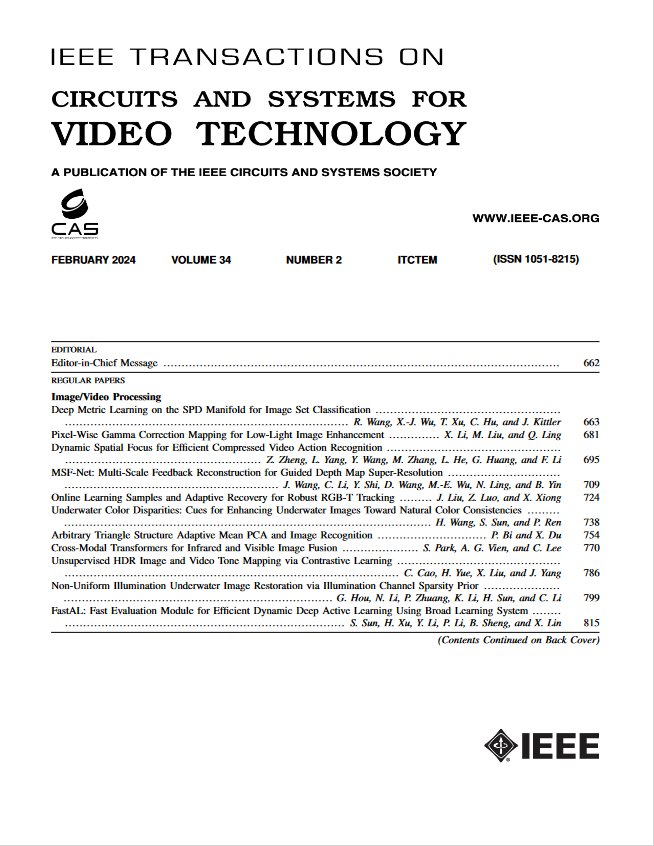Pseudo-Supervised Low-Light Image Enhancement With Mutual Learning
IF 8.3
1区 工程技术
Q1 ENGINEERING, ELECTRICAL & ELECTRONIC
IEEE Transactions on Circuits and Systems for Video Technology
Pub Date : 2023-06-09
DOI:10.1109/TCSVT.2023.3284856
引用次数: 0
Abstract
Low-light image enhancement (LIE) is important for many high-level vision tasks as the poor visibility of underexposed images can severely degrade the performance of the subsequent image recognition, analysis, etc. Although recent deep-learning-based LIE methods exhibit promising performance, most of them require a large number of paired training images, thereby limiting the practicability to real scenarios. In this paper, we propose a pseudo-supervised LIE method with the integration of mutual learning. Specifically, for the given low-light image, we first use a quadratic curve to generate a pseudo-clear image, which is served as the auxiliary ground truth for supervision, then the pseudo-paired images are simultaneously input to two parallel homogeneous branches to learn the expected enhanced result through the knowledge distillation of two branches via mutual learning. As both the generated image and the input low-light image underlies the desired solution, the mutual learning strategy enables the two branches learn from each other and produce the final results. Extensive experiments demonstrate that the proposed method outperforms most existing unsupervised LIE methods in terms of both qualitative and quantitative evaluations, and also achieves competitive performance against many supervised and semi-supervised methods.利用相互学习实现伪监督低照度图像增强
低照度图像增强(LIE)对于许多高级视觉任务非常重要,因为曝光不足的图像能见度低,会严重降低后续图像识别、分析等的性能。虽然最近基于深度学习的 LIE 方法表现出了良好的性能,但它们大多需要大量配对训练图像,从而限制了在实际场景中的实用性。在本文中,我们提出了一种融合了相互学习的伪监督 LIE 方法。具体来说,对于给定的低照度图像,我们首先使用二次曲线生成伪清晰图像,将其作为辅助地面真值进行监督,然后将伪配对图像同时输入两个并行的同质分支,通过两个分支的知识提炼,通过相互学习来学习预期的增强结果。由于生成的图像和输入的低照度图像都是预期解决方案的基础,相互学习策略使两个分支能够相互学习并产生最终结果。广泛的实验证明,所提出的方法在定性和定量评估方面都优于大多数现有的无监督 LIE 方法,在与许多有监督和半监督方法的比较中也取得了具有竞争力的性能。
本文章由计算机程序翻译,如有差异,请以英文原文为准。
求助全文
约1分钟内获得全文
求助全文
来源期刊
CiteScore
13.80
自引率
27.40%
发文量
660
审稿时长
5 months
期刊介绍:
The IEEE Transactions on Circuits and Systems for Video Technology (TCSVT) is dedicated to covering all aspects of video technologies from a circuits and systems perspective. We encourage submissions of general, theoretical, and application-oriented papers related to image and video acquisition, representation, presentation, and display. Additionally, we welcome contributions in areas such as processing, filtering, and transforms; analysis and synthesis; learning and understanding; compression, transmission, communication, and networking; as well as storage, retrieval, indexing, and search. Furthermore, papers focusing on hardware and software design and implementation are highly valued. Join us in advancing the field of video technology through innovative research and insights.

 求助内容:
求助内容: 应助结果提醒方式:
应助结果提醒方式:


